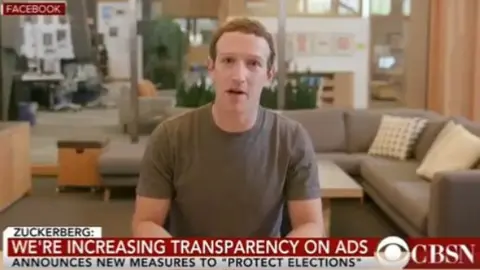Tech Tent: Facebook’s deepfake dilemma
 Bill Posters
Bill PostersIn a video on Instagram this week, Mark Zuckerberg confessed to controlling the stolen data of billions of people and said he owed it all to an organisation called Spectre.
The video was of course faked, and on this week's Tech Tent we examine the dilemma it posed for Instagram's owner Facebook.

- Stream the latest Tech Tent podcast on BBC Sounds
A few weeks ago, the social media giant came under fire for allowing a doctored video of the US House Speaker Nancy Pelosi to remain up.
So how would it react when the faked video of its founder emerged?
The video featured the real Mark Zuckerberg, but the voice and the words emerging from his mouth were not his.
It was the work of two artists, Daniel Howe and a man going by the name of Bill Posters, and was part of an installation on show in Sheffield this week.
When we spoke to Bill Posters he told us that the video had been planned long before the row over Facebook's treatment of Nancy Pelosi.
The aim was to throw a light on Facebook's business model, which involved using behavioural psychology to persuade people to share intimate details of their lives so that they could be targeted with advertising.
"We're shining the light on Facebook and Zuckerberg himself to ask what happens now when it's your privacy and your data that's been used in obscure or unintended ways" he said.
Unsurprisingly, Facebook did not remove the video, It said it followed the same policy as with the Nancy Pelosi video and other misinformation on its services - let third party fact-checkers determine whether it was fake, and then make it less visible in users' feeds rather than taking it down.
#deepfake
Bill Posters points out that the video featured the hashtag #deepfake and was never meant to deceive anybody.
It is hard to believe that anybody happening across this artwork with a voice which sounds nothing like Mark Zuckerberg would be fooled.
But month by month, deepfake technology is getting ever more sophisticated.
Soon, it will become extremely difficult to spot whether words have been put into the mouths of politicians, or whether celebrities' faces have been placed in scenes where they were not present.
Both identifying such videos and deciding what to do about them will become an even greater challenge for Facebook's moderators, while giving the company a powerful role in determining the limits of free expression.
Bill Posters says that means things need to change.
"To do that it needs collective understanding of very hard, obscure, hidden technologies and methods. But it also needs regulatory oversight as well," he said.
Regulation time?
The call for regulation of Facebook and the other US tech giants is getting louder - from Europe in particular.
Tech Tent also hears from European Commissioner Carlos Moedas and leading UK tech figure Hermann Hauser, who both insist that Europe is setting the pace - with the GDPR data privacy directive just one example.
And Hermann Hauser has one radical solution to the huge power and dominant market share of Google, Amazon and Facebook - break them up.
